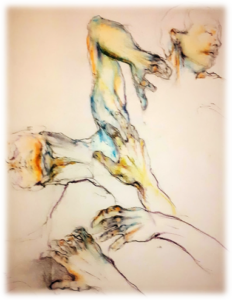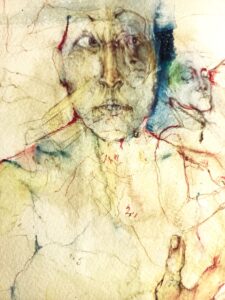Imagine
“We are transitioning to a new era…in the uncertainty created by the fact that our old rationalities and sensibilities are obsolete while new ones have not yet been identified. Based on the experience of similar periods in the past, we should turn to the artists, who can often sniff out the coming of a new era; they produce their creations not by using the old logic but with new insights” (Esteva in Pluriversal Politics, by Escobar, 2020).
We all possess the power of the imagination of how we may steward our Earth back to the Holocene – the epoch in which our biosphere thrives and how we and our fellow non-human species may thrive within it.
Flip the tiles to reveal all manner of prose, poetry and links to a diversity of artivists’ work: allow the trip to upset your well-crafted rhyme and reason; that it breach the echo-chambers in which you tend to reside. May you go places that challenge your political, socio-economic sense and sensibilities of ‘home’. Allow your imagination to wonder and wander along a stream of consciousness as to why and how we should embark urgently on a just and feasible path that enables human and non-human species to thrive in ecosystems that flourish well within planetary safety thresholds – for today and the generations of tomorrow. It is for you to imagine how the Blueprint may play its part.
Statement of human originality: no generative artificial intelligence(AI) was used in the creation of the writing, drawing and painting of any of this content on this website.
Holocene
The Holocene is the geological epoch – a period that began 11,650[1] years ago- that marks the geological age when the biosphere was conducive to such habitable conditions so as to enable the emergence of settled societies.
This shift from nomadic to settled livelihoods beckoned the Agricultural and Industrial Revolutions and the very institutional foundations that allowed the modern age to come of age as the scientifically “enlightened” and technologically precocious web of complexity we know today, all but imbalanced by extreme inequality.
[1] https://link.springer.com/chapter/10.1007/978-981-15-1443-2_3
Anthropocene
We stand now to witness the genesis of the Anthropocene[2] , a term coined to denote the abrupt shift out of our clement home of the Holocene and into the epoch of ‘hothouse’[3] Earth as a consequence of human activity.
Human behaviour has been at fault in its resource-grabbing excess. What’s more, humanity’s response by those most responsible has been fraught with pushback and denials.
[2]http://quaternary.stratigraphy.org/working-groups/anthropocene/
Global Warming
As early as the 1930s, the Callendar Effect[4] (1938), was postulated by an amateur meteorologist that global atmospheric warming was connected to human activity (research much dismissed by the scientific community at the time), and at the dawn of the nuclear age[5] (in 1945 in the development of the atomic bomb), there has been predictions of the coming of the geological signal that would identify the Anthropocene epoch[6]; an era so soon to be etched in time and acknowledged as such , like the portent of a self- inflicted apocalypse that we must be called upon to avert.
[4] https://www.weforum.org/agenda/2022/02/climate-change-global-warming-carbon-dioxide-fossil-fuels/
[5] https://www.bbc.com/news/science-environment-13335683
[6] https://www.dw.com/en/canadian-lake-shows-start-of-anthropocene-era-scientists/a-66195820
more-than-human Life
Re-embedding human activity into the larger web of life is more than just a legal or scientific enterprise. It also involves emotions, aesthetics, and culture, requiring new and currently undervalued modes of thinking, feeling, and creating in the world.
Get to know the MOTH More-Than-Human Life
Cuerpo Migrante
El arte aúna otros niveles de presencia. Somos un ser natural. El arte nos reconecta con la esencia que tiene que ver con la naturaleza. Nos lleva a un otro lugar que nos libera. Y ahí viene para el sentido de lo espiritual.
Escucha la entrevista entera acompañada por “clips” del taller “Corpo Migrante: um corpo ressonante” con la artista interdisciplinaria de artes escénicas Ana Kavalis
Chlorophyll: a litmus test for biosphere integrity and climate change.
Chlorophyll: the green pigment/molecule essential for photosynthesis in plant life. Chlorophyll allows the absorption of sunlight as the energy source that converts carbon dioxide and water into carbohydrates.
Chlorophyll shows a greater sensitivity to changes in external conditions than do other pigments in foliage, (e.g. carotenoids). Therefore, chlorophyll content is a robust indicator for environmental stress, changes in temperature, humidity and air and soil pollutant levels.
Theriocide
Lain meat. A carcass sore./ Apt to rot, save steak done raw./From nose to tail and pleading paw./ A slice of brain. A wrinkled lair of life’s terrain.
A faint existence, damned and sold./Sentient: fear of blood, stone cold.
Do you wrestle with a conscience, Chill
That Human’kind’ so breaks our
Will?
Is our consumption and ways of life ethical?
Get to know how art meets ethics.
Floraissance
Contemporary art has become outdated.
The art gardener cultivates art in the lives of others.
Art movement
Forest Cat
get to know the forest cat project in finland
Retratos de mi sangre
Peru
Shipibo-Konibo: Retratos de mi sangre
Photography reveals family history and narrates the presence of coloniality…
Get to know mural work through
Cholitas de Babilonia
The collective “Cholitas de Babilonia” reminds us of the Andean migrants’ presence in the big city of Sao Paulo.
How do Andean traditions contribute to moulding a city with other narratives than those focused on growth?
Na Varanda com Carolina Velasquez | Ativação dos corpos – espíritos: Costura ancestral
Arte migrante: 11 artistas e 11 obras em 2022 – Cholitas da Babilônia – Museu da Imigração
The Power of Hip Hop
“Hip Hop was on the streets. It’s so powerful because it’s so easy to access. The fact that Hip Hop came from migrant people, from African people, was amazing because it also connected us to our roots, to our past, to our history.”
Listen to the full interview by the Costa Rican Hip Hop artist Nakury given to the Latin America is Moving Collective and carried out by Louise Morris.
Big Brother’s Watching Out for Whom?
.
2025: the ruling Party wields power “for its own sake”: Earth science has been debunked and Postgrowth narratives ridiculed to expedite über free-reign Neo-Capitalism.
But little did they know, we are watching YOU, Big Brother.
Brave New World meets 1984
Regression is a fetid lake
Where rampant Populism plants its stake
By SM, taut at the neck
To choke our neural hi-tech
Unconscious:
Doped, duped, democratically denuded.
Grown-ups heeded not the science they were told
Tears, my only drink /To let me fall asleep/ To dream my dread/ Of waking up, half dead. What next, when my tear tap/ Runs but dry? Why did the grown-ups not come to rescue me/ From my salty rain/ Would then my tears of laughter/ Be so devoid of pain.
Exile
Imagine I were in life’s underpass, uprooted from my anchored past. Of home, of country, of tethered tree- of branch, of roots that make me, Me. An underpass of trepassee. To foreign lands, recoiling sea. Of my chapped lips, which chatter, ‘refugee’. I cannot imagine such rotten routes of life that upheave my being. Such bitter strife But such is my luck of tempered climes, where my achored bough shall see no times…
Dig deep Adaptation
https://lifeworth.com/deepadaptation.pdf
Red Hot
Dying of Thirst/Lines drawn in the sand,
Root and branch/In equatorial lands, whose geographic fate, is all that we would contemplate/With platitudes in fits and starts, broadcasts of ailing crops/Of humans and their livestock, Parched. For we, once cosy folk of temperate climes/We, the humans daily quenched: lawns hydrated, AI showered/Paddling pools, 1 foot drenched/Now we, once blessed/Have pushed our luck, Failed to give a flying f**k/About our oven’s dial-up switch: our methane-carbon belching bitch.
Flood Lit
Wishful Thinking
Vitruvian WoMan
Dinosaur. Bird. Human.
Extinct. Swansong. Self-Denuded. A lifestyle of good riddance to nonhumans and barely do we hide our shame
Plastic Fossil
Plastic Industry, post-WW2:
LANDFILLS -be filled!
Fossil polymerised into plastic permanence: what a fitting tribute to biodegradable life-bottled into permanence, its micro traces ingested and inhaled by us, humans, who play unwitting host to its rest in peace.
Mummified for posterity be
Where buried beneath the rays of UV.
Evolutionary intelligence
Human-eity
On female life support
Das Gift von Holocide
AI erasure
Das Gift von Holocide
Don’t avert your eyes
A crying shame
Water, water everywhere, yet not a drop that’s clean. Stagnant ponds are dead alive to aspirating bream.
Plastic water, for pity’s sake /Inhale, absorb, ingest, intake/ wetting on one’s dermis, fully caked.
Flooding floors of sewage, teem
Breached heavy metals, seam, by neurotoxic seam
Befalls this rain
A crying shame that life’s water-falls in vain.
Pluriverse – 2D-3D
Planetary Boundaries
”For the first time, an international team of scientists is able to provide a detailed outline of planetary resilience by mapping out all nine boundary processes that define a safe operating space for humanity.”
https://www.stockholmresilience.org
/research/research-news/2023-09-13-all-planetary-boundaries-mapped-out-for-the-first-time-six-of-nine-crossed.html
https://www.stockholmresilience.org/research/planetary-boundaries.html
Shapeshifting Realpolitik
What Holocene demands
Should mob our minds
That Nature do we owe Her debt
Arrears: our existential threat
Fickle fines Realpolitik
Around the clock, Tock Tick.
Tock Tick.
Precautionary Principle
Only humankind makes fire with intent.
A soil of sixty harvests
Blood on our hands
Bloody man, bloodied woman, bloody Hell. Stubborn is our future's stain without refrain: to cauterise.
Orangutan:
“man of the forest”
Enlightened…but only on the short-term
Pyrrhic Victory
‘On tenterhooks’
Migration
Das Gift von Holocide
Siia ekobé ita maramunhã
The livrinho uses digital art in telling the story of Brazilian community leaders. Access the book.
In this encouraging book, we hear in Portuguese, Tupi-Nheengatu, Finnish and English from individuals, young and old. The voices of the leaders of Northeastern Brazil tell us that unity, perseverance, and hope are key to building transformative presents. Flip through the book to find their stories told by digital collage. The book is the result of the work carried out by the Boas Práticas, Good Practices for Covid19 Project.
The Writing’s on the Wall
Postgrowth: Flora. Fauna. Let Florish.
Myopic
Hyperbolic Discounting: humans have evolved to prioritise the present over the future.
The Naked Truth
I am more than my brain cast by stars and their sand, / More than its tethered by the lay of its land.
Of genes and phenotypes in behavioural spleen, /Of epigenetic counting beans. /Soft–wired gurgled- pit- of- one’s gut/I am more than this matter held in a nut
I, in my mind, which my will shall rebut
The truth of me, myself and I
Is one of Nature’s many, Whys?
Feminist Climate Justice
Feminist climate justice: A framework for action (UN https://www.unwomen.org/sites/default/files/2023-12/Feminist-climate-justice-A-framework-for-action-en.pdf.)
Will we be good ancestors?
In the annals of the Human Race: Anthroposcenic: its grubby grab for finite space/ Evolved beyond Nature in service to their needs, Profligate sons, debt- serviced greed.
The human race, left wanton trace: unsated desires/Remnant synthetics and cindered pyres.
The human race, lost face – Like wretched dement/De-soiled cement.
All but their gene pool dyed out of the blue / Deplete in their lifeline, drained of green hue.
Fractured, Fraught, Frazzled.
If writing were to purge:
‘A fractured mind/Discarded peace/As faculty’s expired lease,
Disease by stealth/By predatorial stealth/Dissed health.
Tangles serve/To disconnect/The compos mentis late preserved/
Subconscious is the film miscast,
Dubbing foreign in this moment,
Past.’
Washed Out
Indelible mark
Ocean Tide to Life
Original virtue
Das Gift von Holocide
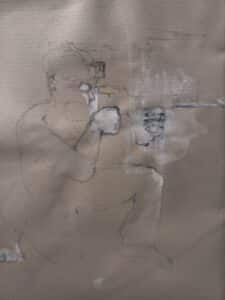
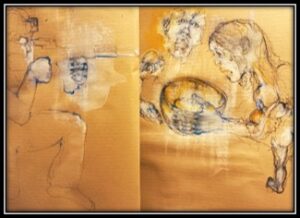 Genocide: Greek prefix genos, meaning race or tribe, and the Latin suffix cide, meaning killing.
Genocide: Greek prefix genos, meaning race or tribe, and the Latin suffix cide, meaning killing.
Scorched Earth
An
Das Gift von Holocide
Resilience
Das Gift von Holocide
Bond transcends time and space.
…when push comes to shove…
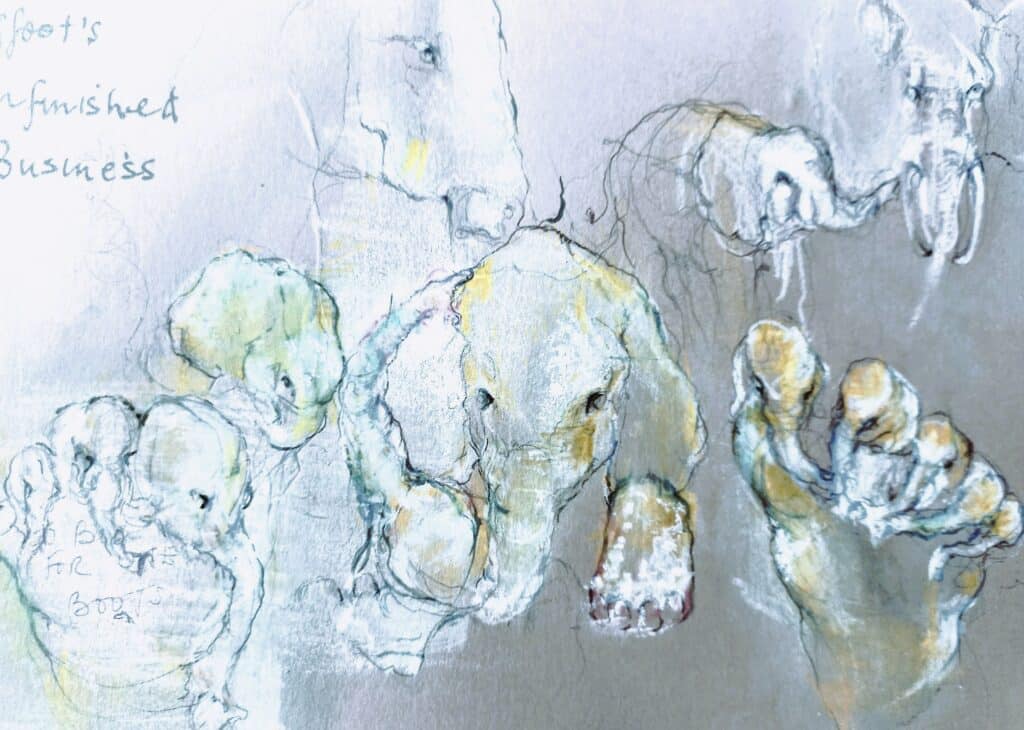
A
Gravity won’t acquiesce
Das Gift von Holocide


